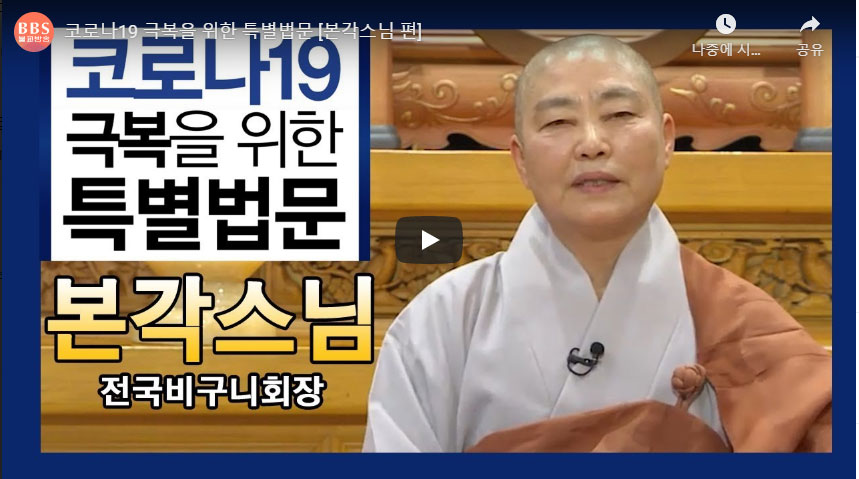The entire world is going through physical, psychological, and financial difficulties due to Covid-19, which is now a pandemic phenomenon. In this rough time, we are trying to find refuge in the Buddha’s teachings. We seek to share the wisdom of many from various countries in overcoming this pandemic difficulty. We wish that all of us, together, overcome this pandemic difficulty by finding comfort in the Buddha’s wisdom.
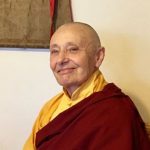
Ven. Tenzin Palmo sunim
1. Here we are in lockdown for the duration (Prime Minister Modi says 3 weeks but here in in Himachal Pradesh authorities say 2 months). Himachal is sealed and nothing can come in from other States. There have been a few cases of death from the virus in surrounding areas so there are police and army patrolling to stop traffic or anyone wandering around. Our DGL Nunnery gate is closed so nobody can go in or out. The nuns brought in large amounts of basic supplies such as rice, flour, lentils etc. and sacks of onions and potatoes for the duration.
2. Here our nuns continue with their daily schedule of studies and rituals. However they have increased the rituals carried out on behalf of the world. Some Buddhist teachers are recommending the recitation of certain sutras or mantras as a protection and blessing.
3. It is important to remain calm and equanimous in the face of these challenges. The important point is how we respond to the situations in life, so we should look to see how much the Dharma is actually influencing our reactions and conduct. This is a time for cultivating our empathy towards the suffering of so many millions in the world at this time, and practicing loving kindness and compassion in both thought and action.
4. Obviously it is good to read some Dharma books that benefit and instruct us, recite sutras for auspiciousness, and watch any teachings by spiritual masters who inspire us in our practice.
5. This is a time to go inwards and cultivate our meditation practice but also to reach outwards to help and console wherever we can. If one is with one’s family then to cultivate patience, good humour and kindness. If one is alone then to use this time as retreat and intensify one’s inner practice.
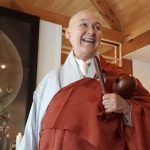
Ven. Chi Kwang sunim
1. As we are all aware Covid-19 is a world pandemic affecting some countries more than others. So far in Australia due to early intervention of restriction, good medical care, we have had less death. Other than the in the Health care sectors and some services, people haven’t been encouraged to wear face masks or gloves, however the advertising on using of sanitizers, hand washing, distancing and self isolation have generally worked well and most pockets of infection have come from not following guidelines. In Australia some restrictions began late January, the first with quarantining people from China and Iran, then Europe. However most cases came from people returning on cruise ships. Flights and other travel were greatly reduced early March and soon all International travel was stopped, even between states within Australia, other than a few humanitarian
flights, returning citizen.
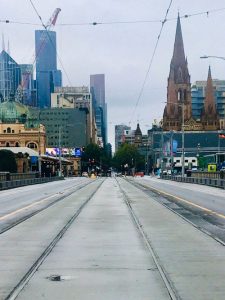
The city is empty
Social distancing of 1.5 meters between people was enforced, still people flocked to beaches on warm days, in Sydney and Melbourne, so further isolation was imposed. No gatherings at all, anywhere, other than those living in a house. Only essential worker could leave home except, people to buy food and essentials or for exercise. Still many ignored requirements and so the virus began to spread. Heavy fines were then introduces, checks and house or hotel quarantine have been enforced with police guards since early late March. Streets have been empty of people 6 weeks now, many businesses closed, only take away food and drinks, groceries and essential stores are open, with limits on numbers entering them.
Since the first death on March 1st, now on the 15th of April there are 6,414 confirmed cases,
61 deaths. 367,700 people have been tested. Many however like myself who believe we may have had the virus in Feb. or March, were told to just self-isolate. Testing is only more available now to general public who have the symptoms. Before it was offered to those who had traveled, or had been in contact with effected family or friends.
I have been at home six weeks now and traveled only to the local shop twice, once to a doctor for yearly flue injection and to a hospital for a check up. No one I know is visiting anyone, even family.
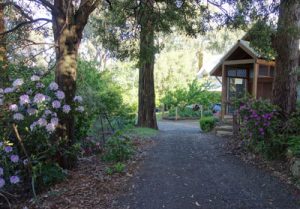
Front entrance
2. I live in a lovely quiet environment surrounded by Australian forest and wildlife, so it is always very peaceful here, like a retreat, but even more so now. Still everyday I’m very busy with my morning and evening Yeoble and meditation practice. I serve several Buddhist committees, including Sakyadhita Australia as Vice Chair and I’m helping the Buddhist Council in Victoria create a Buddhist Library and Education Centre. Now all meetings are online. I have a number of Zoom classes for meditation and talks and this weekend is an online Meditation retreat, this may offer some challenges? People call regularly, including an old Korean friend who is also now facing death. I see it is a very stressful time for many, especially couples working from home with small children.
Yesterday, I worked on updating a GoFundMe page on our Sakayadhitaoz sight. Having sponsored Children at the Red Kangaroo in Sarnath, India, I informed the committee there are two organizations run by Australian Nuns in India and they are needing help to get food to the children and families during lockdown as they are living in remote villages. Could we help a little? In 2 weeks we are half way to reaching out goal of $10,000. If our readers in Korea can offer a little, please go to the website sakyadhitaoz.org and click on the Go Fund me sight, to make a small donation. Thank you!
3. Become more fully engaged in caring about what you are doing now, with the people you are with. We have a great opportunity to grow a practice of patience, respect and kindness with those sharing your life. In regard to this interconnecting world we find ourselves in right now, I tell people I’m on a Corona retreat and I sense more deeply my own life’s fragility and imminent death, with those who are succumbing to this virus. During this time I’ve been learning skills of deeper listening and deeper observation and noticing though the human world that is in panic and heartache, however, it’s also waking up, and being more compassionate.
One group I work with is a ‘Contemplative Social Action Network’, it is a group of engage people working skillfully in many circles of social needs. My personal action is on the senseless logging and destruction of local old growth forests. After recent devastating Bushfires in Australia, (replaying for me 2009’s Black Saturday) Coronavirus followed and now on this mountain opportunistic, senseless logging has began, whilst we are in lockdown? To bring witness to all our current and past suffering, our CSAN network created a weekly online meditation. We sit in silent meditation, till someone wants to share a deep concern or story, then we turn our listening on what that person is saying, with our full attention and caring mind. It’s what‘s simple called ‘Bearing Witness’ and is like sharing a Hwatou with our teacher, who devotes their attention fully on what’s being expressed, beyond words and other. I’m finding this practice very helpful to hold the world and my, greed, fear, pain, panic, demise and too, it’s re-birthing. Seeing peoples genuine care and kindness coming forth naturally, is very wonderful!
4. Movie: I don’t watch many movies, however recently our local SBS TV, offered a movie called the ‘Physician’ In an 11th-century English town, an orphan who sees his mother die, vows to study medicine and eventually travels to Persia to discover the cure for the Black Plague.
Book: Standing on the Edge by Joan Halifax. She came and spoke beautifully at the Sakyadhita International conference in the Blue Mountains. This is a personal journey and that of many health professionals. She talks about five states, altruism, empathy, integrity, respect and engagement. That while good, if we overly engage, they cause distress and burn-out. She shows us how to see our self-destructive patterns, be present with and a witness of them.
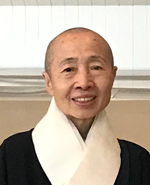
Ven. 丸山 劫外 sunim
1. 小学校、中学校、高校、大学はお休みですので、子どもたちはどうしてよいか困っています。お店は普通に開いています。買い物にも自由に行けます。今のところ、レストランは営業しています。しかし、あまりお客さんはいません。食べ物以外の買い物は、皆出かけないようにしています。お寺での、お葬式は、家族だけ。法事も家族だけでしています。マスク、手洗いなどをしています。
2. 多くの寺院で、新型コロナウイルス感染終息祈願法要をしています。私も毎朝、祈っています。それ以外には、なにもできないです。お寺での多くの人が集まる法要は、今年は取りやめたお寺が多いです。私のお寺も、ごく限られた家族だけの予定でしたが昨年ご葬儀をつとめた家族、感染の状況を見て、それもやめるかもしれません。日本人の多くは、畏れてはいても危機感には乏しいように感じられますので、非常に危ないと思っています。
私が住んでいます所沢市では、今のところ感染者が3人くらいのこともあり、市民生活は通常と変わりません。しかし、それぞれ注意はしているようです。お寺もご葬儀や法事に集まる人数を極力少なくしています。皆様もくれぐれもお気をつけくださいますよう。
5. コロナ19の危険性を認識する必要があります。人間が作り出した毒ですね。解決方法は容易ではありません。この状態を克服するために原因を見つけることが重要です。私の考えではコロナ19は中国で始めました。コロナ19は、核兵器よりも危険だと思います。 私はこの危機を克服するために懸命に祈ることしかできません。
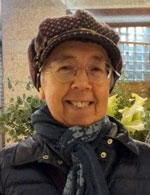
Martine Batchelor
1. I live in South West France in the countryside far away from any clusters. I am confined at home like everyone else with my husband, my mother and her carer. I go shopping once a week and I go for a short walk everyday, protecting myself as recommended because my mother is 93 years old though in good health.
My concerns are for the people and the medical staff living in clusters where many people are in hospitals in intensive care, some recovering, some dying. But also for seniors who in cluster regions are dying in retirement homes in great numbers. In retirement homes where the medical staff were proactive earlier before the confinement happened, few people are dying or not at all.
Everyone is talking about the South Korean approach which everyone is admiring for its good results. At the same time one ponders that French people having a different temperament they might not have accepted the surveillance, GPS checking and quarantine separating them from their family. This is why stopping the confinement in a safe way might be more difficult in France.
2. I feel that all the meditation practice I have done since I am 22 and I am 67 now has prepared me for this. I was a nun for ten years in Songgwansa. Every year twice a year 3 months at a time we sat in meditation ten hours a day without going out at all apart from walking in the mountains.
For the last 33 years I have been teaching week long meditation retreats once a month where again we are confined for a week without going anywhere. So this is not new for me to be confined at home. I am very comfortable with this situation. When practising meditation we become aware of impermanence and death very deeply, so I am not afraid of this situation. I protect myself for my own sake and the sake of others and then what will happen will happen. There is no need to worry beforehand if one is careful.
3. We do online courses and classes nowadays and most people who have meditated for some time found this a great opportunity to practice and to be kind to themselves and to others. This situation takes us out of our automatic lives as it is so different and extraordinary so it could lead to more connection, compassion and humility, and also to discover one’s own resources.
However for different people in different circumstances it might be difficult or easy in a different ways. I was reading an article and a thread on twitter where people who were prone to anxiety, depression, OCD or who had some autistic conditions. Some said they felt so much better. The anxious ones said that since what they feared happened they could deal better with it than they had imagined. Also they felt more equal as everyone was equally anxious and since they were used to deal with anxiety they could help those who were newly anxious. Some people who tended to have depression or OCD or autism felt a bit the same. Of course some people with those conditions said that it made them feels worse.
In these difficult times it is important to cultivate stability and balance. What is it that helps one to experience some balance, calm and stability? Remembering the good things in one’s life is also helpful. Trying not to be overwhelmed by suffering and the feeling of compassion that arises. Trying not to save the world but thinking: what is the least I could do to alleviate my suffering and the suffering of others?
4. My book on my life as a nun and the life of Songgyong Sunim could be helpful. Haemin Sunim’s books. Popjong Sunim’s books. Stephen’s book on solitude newly published in Korea.
5. I am so glad that South Korea is dealing well with this crisis and has so few deaths compared to France for example. I hope that people will continue to connect and support each other in these difficult time with wisdom and compassion.
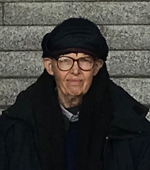
Agatha Haun
1 and 2. At present I'm attending classes in Danish language and culture at a folk high school in Denmark. A folk high school is like a boarding school. The students live at the school for the week, month, or several months when they are studying. Most students are young adults, doing a 'gap year' course after graduating from secondary school or from undergraduate studies. Schools have different courses of study. This school, in a village called Askov, (on the Jutland peninsula), has classes in Danish for foreign students, and literature, journalism, robotics, and computer game design courses for Danish students.
The Danish prime minister, Ms Mette Frederiksen, ordered a 'lockdown' or quarantine period, which now has been extended to 13 April. This requires that schools, universities, shops, businesses, and offices, except for some grocery stores, pharmacies, and essential government departments, must close and people must stay home. People are supposed to work from home on-line, and students are supposed to study on-line. Denmark's government will try to provide economic assistance to businesses and workers who are affected by the quarantine. People are supposed to stay at home and go out only for essential purchases such as food or medicine. Some restaurants serve 'take-away' or deliver to homes. Some people go out to walk or bicycle, to get exercise.
Most students who were studying at this school went home when the quarantine measures were announced. This school is in a rural area, so I'm not sure what the situation is like in cities like Copenhagen. Denmark seems to be managing the situation fairly well. There have been some racist incidents, reported in the newspapers here, that people who appear to be East Asians have met with hostility from Danes who think that they are Chinese, and thus carriers of the corona virus. Such verbal and even physical attacks on people who appear to be East Asians, have also been reported from the USA.I haven't seen any of these encounters, I only have read about them.
I'm studying Danish in order to be able to study Greenlandic, the Inuit (Eskimo) language of Greenland, later on. Greenland is a former colony of Denmark, and has home rule, but Denmark still manages foreign affairs. Almost all study materials and classes in Greenlandic require a knowledge of Danish. This school has a large library with sevral books about Greenland.So in addition to our on-line class with the teacher and two other students, I spend much of the time reading in Danish. We have some reading and writing assignments, which we send to the instructor by e-mail.
3. Look after your health and the health of others, as each individual depends on everyone else. Do what the medical / health service authorities advise / order. Testing and tracking anyone who may have been exposed to the virus is essential. Koreans have done a lot to try to control the spread of the virus.
In Denmark and other European countries, the advice or orders ar usually as follows: Wash hands frequently, and / or use hand cleanser. Use face masks. Avoid physical contact. Keep 2 meters distance from others. Stay home, work or study from home. Avoid crowds and gatherings. Consult medical services if you have symptoms of covid-19. Everyone receives this advice in Europe and everyone should follow it.
Be patient with others. Help others, especially those who are more vulnerable to the virus, such as old people, people with health problems, people with no sources of income if they do not work, people with young children. Consult your neighborhood or city authorities and ask whether you can give help to others, such as shopping for people or delivering food. Talk with your neighbors, families, and friends to share ideas, advice, find out what is needed.
Share resources and services. Be self-disciplined and well organized. At home, practice meditation, yoga, physical exercises on a regular basis, to keep your mind and body in shape. If you can communicate with others in your groups, exchange ideas on mental and physical exercises that you can do individually or with others, via internet linkups. Some people take up new activities that require concentration and offer intellectual stimulation, such as language study.
4. I read the on-line 'Guardian' newspaper from Britain, www.theguardian.com, You could find some suggestions about films and books there. It has broad coverage of the corona virus crisis, including many articles on what people do and advise doing, in terms of reading, exercises, various activities, home schooling, helping others, books to read, films and TV programs to watch.
You might have a reading group already, or you could start one. Everyone reads the same book and the discussions of it are carried on by internet linkups, smart phones. social media etc. Some books about survival in hard times might give people inspiration and courage. Albert Camus' novel 'The Plague' is an allegory symbolizing the Nazi occupation of France in World War II. Many people have been reading it. It probably has been translated into Korean.
Koreans endured many of the same hardships during the Japonese occupation, so there must be many films and books about that. I don't know of any titles of books and films about this, but if you discuss it among yourselves, you will probably think of some that you may have at home, or which are available as DVDs or through the internet or from public libraries.. Think of films, TV programs, and books that tell about Koreans in solidarity with each other, fighting against the occupation, a danger that affected everyone. Your groups of friends, neighbors, fellow workers, or others can read such books or watch such films and TV broadcasts together or individually and talk about them via phone or internet linkups. There's a new film about Louisa May Alcott's book 'Little Women'. I have read the book, but haven't seen the film. Probably both are available in Korean translation. It tells us a great deal about family solidarity and mutual help in difficult times, (during the US Civil War, when the father was away from home) about staying strong, and helping each other to stay strong.
5. As members of a world wide Buddhist women's organization, Sakyadhita sisters can reach out to each other across boundaries and share their combined strength based on Buddhist teachings. The Buddha and his followers experienced and wrote about all kinds of human suffering, showed compassion, and gave teachings to show us what to do in such situations. This is a good time to look again at Buddhist writings from different countries, through the centuries and review what we have heard and read before, such as Sakyadhita conference presentations.
In reviewing these teachings and meditations, we will find passages that apply to our situation now. The Buddha's words are for every day, for all situations, for everyone. We need to think about them, remember them, apply them to our current state of affairs. Think of this time as an opportunity to organize an international Sakyadhita conference through the use of the internet. Every Sakyadhita conference has a specific theme for which participants present papers based on their own local experience. Think about what presentations you would write and talk about at a Sakyadhita conference that focuses on our current international crisis and how we should deal with it. Set up a special interactive site for Sakyadhita members to present their contributions, formal or informal, individual or group presentations, academic or practical, and for readers to respond to, as you would at a conference, with questions, answers. and comments.
This might be a good way to begin. Let me know how it goes.
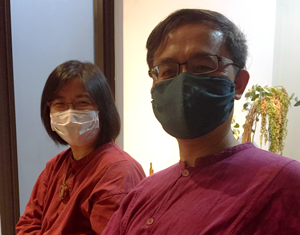
Cristie and Frank
1. Frank and I returned to our apartment in Taipei, Taiwan in early February after having traveled in Thailand and Malaysia during the Chinese New Year time (late January). Maybe due to the experiences of SARS as well as the fact that Taiwan is geographically closer to China and learned some situation earlier, Taiwan has seemed much more concerned about a potential epidemic/pandemic even before our return. Even though we were not in Taiwan during the Chinese New Year, we saw how people had started sharing precaution measures on social media and some had stopped regular new year activities, etc., which turned out to be a big contract to the much more festive Bangkok, Penang, and Kuala Lumpur that we traveled to.
The atmosphere back in Taiwan has been rather tense all around, and the government has come up with policies for mask purchase, social distance, etc., and it has swiftly adjusted related policies according to the changing situations-- for example, mask purchase has improved from waiting in a long line physically outside of a community pharmacy store to ordering online and pick up at a designated 7-11. In a way, Taiwan has started getting ready since late January, and people are very much aware of the risks involved even though there's no lockdown nor travel movements up till now here.
Everyday, people await to be updated by Taiwanese CDC's press release at 14:00 sharp- which has also become part of the new way of life since COVID-19 strikes.
2.In addition to doing general prayers to wish all sentient beings free from suffering, now in the prayers or dedication of merit, COVID-19 is especially mentioned.
May all those who suffer from COVID-19 be free of fear and free of all sorts of suffering.
Awareness of personal health conditions has been increased-- attention to proper and basic hygiene, such as washing hands with soap thoroughly, is added to daily practice as part of mindfulness meditation in action. Practice social distancing with both mindfulness (not to fall into habitual auto-pilot mode as to hug/shake hands, for example, when encountering people) and compassion (sending warm greetings with smile and genuine eye contacts, for example). Reaching out to family and friends by using social media and/or phone so as to practice compassion too.
3. Try to recognize all the challenges in this new environment as opportunities to reflect upon and to practice the Buddha Dharma. It'd be truly worthwhile if only we try.
4. Recommendations are everywhere; I feel I should not add more so that there's no "infodemic" added to this troublesome pandemic already....
I would say try ANY book or movie that you take interest or feel a calling for-- but do read/watch deeply and thoroughly, now that you have time and there's no rush. Use them to also reflect upon the Buddha Dharma you've heard/practiced-- I think it's be an interesting, useful, and in time, rewarding exercise.
5. It's not easy facing changes and uncertainties-- however, even without COVID-19, changes and uncertainties have always been our daily experiences, though perhaps not as obvious or immediately threatening.... Well, we can only continue doing what we can, planting all positive causes and moving on with "wise hope," like Roshi Joan Halifax has reminded us back at the Sakyadhita conference in Australia last June.
For example, despite the fact that no one can predict what lies ahead, we continue to make the best plan we can for the next Sakyadhita conference in Kuching, Sarawak, East Malaysia. Knowing that most international gatherings have been either canceled or postponed to next year and with all the information learned already, it will be unwise not to consider the possibility to adjust our plan. Therefore, with countless discussions between the Sakaydhita International and local Malaysian conference organizing committees as well as tireless efforts and coordination made ensuring voices from all directions heard and concerns taken into consideration, we have, so far, decided to postpone the 17th Sakyadhita conference from next June to December.
More details soon!
So, you see we continue to move Sakyadhita conference planning forward and we also look much forward to having another reunion with all our dear Sunims and sisters from Sakyadhita Korea in Borneo, the largest island on earth where three countries co-exist on this one island and where its rains forest is believed to have existed even before the Amazon's...!
Please do plan to join us there, despite uncertainties with COVID-19!
I hope to meet you all at Sakyadhita@Sarawak next year!
Or- as I am also "planning" to visit Seoul this September, so if all causes and conditions allow, I will meet some of you this September!
May you all stay safe and well through this quiet storm of COVID-19.
May all sentient beings be free from suffering.


